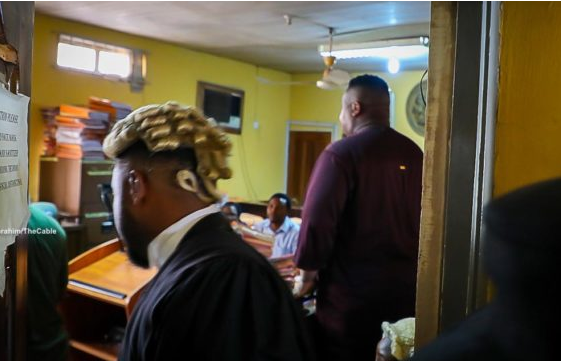Yahaya Bello, former governor of Kogi
Since the end of his tenure as Kogi state governor, Yahaya Bello has been in a running battle with the Economic and Financial Crimes Commission (EFCC).
The anti-graft agency has accused the former governor of being involved in the laundering of N80.2 billion belonging to the Kogi state government.
On April 17, some EFCC operatives barricaded Bello’s Abuja residence. Amid the siege, a Kogi high court delivered judgment in a fundamental rights enforcement suit restraining the commission from “harassing, threatening to arrest or detaining” the former governor.
That same day, the EFCC obtained a warrant of arrest against Bello from a federal high court in Abuja.
Advertisement
The former governor was later declared wanted by the anti-graft agency after failing to show up for his scheduled arraignment in court.
The EFCC’s action has sparked a debate about whether or not the commission is in breach of the Kogi high court’s order.
THE GENESIS
Advertisement
On February 8, 2024, Bello instituted a fundamental rights enforcement suit wherein he prayed the court to declare that “the incessant harassment, threats of arrest and detention, negative press releases, malicious prosecution” of the EFCC — “without any formal invitation” — is politically motivated and an interference with his right to liberty, freedom of movement, and fair hearing.
He also sought an order “restraining the respondent by themselves, their agents, servants or privies from continuing to harass, threaten to arrest or detain” him.
On February 9, the Kogi high court granted an interim injunction restraining the EFCC from “continuing to harass, threaten to arrest, detain, prosecute” Bello, his former appointees, and his staff or family members, pending the hearing and determination of the substantive originating motion for the enforcement of his fundamental rights.
On March 12, the EFCC filed an appeal against the interim injunction.
Advertisement
Delivering judgment on the substantive motion on notice on April 17, Isa Jamil Abdullahi, judge of the Kogi high court, granted an order restraining the EFCC “from continuing to harass, threaten to arrest or detain” Bello based on the criminal charges now pending before the federal high court in Abuja.
The court, however, noted that EFCC “cannot be restrained from exercising its statutory mandate to investigate and prosecute persons or authorities reasonably suspected of having committed financial crimes as obligated under its Establishment Act”.
“Accordingly, I will make no such order,” the judge added.
Consequently, the judge directed the commission to file a charge against Bello before an appropriate court “provided that the respondent shall not invite, arrest or detain the applicant on account of a reasonable belief that the applicant has committed any financial crime, without first obtaining the leave of a superior court of record, especially haven regard to the antecedents of the respondent in the manner it has managed its engagements with the applicant”.
Advertisement
Shortly after the Kogi high court delivered its judgment, the EFCC secured a warrant from Emeka Nwite, presiding judge of the federal high court in Abuja, to arrest Bello.
LAWYERS DIFFER OVER LEGITIMACY OF WARRANT/CHARGE
Advertisement
Lawyers have expressed contrary opinions about the arrest warrant secured from the court and charges filed by the EFCC against Bello.
A 19-count charge was filed against the former governor on March 6, and although his arraignment was scheduled for April 18, the matter was stalled due to his absence from court.
Advertisement
At the court session, Abdulwahab Mohammed, counsel to Bello, told Justice Nwite that the court lacked jurisdiction to grant the warrant of arrest in the first instance.
He referenced the February 9 interim injunction issued by the Kogi high court, adding that the appeal filed by the EFCC is still pending.
Advertisement
Muhammed accused the EFCC of trying to put the judge on a collision course with the court of appeal.
Commenting on the matter, Adeola Adedipe, a senior advocate of Nigeria (SAN), said the EFCC’s action is a violation of the Kogi high court order.
He said the court’s judgment of April 17 does not override the interim injunction of February 9 which the EFCC allegedly violated.
“There is a breach already and you see… that breach has led to a lot of personal breach,” he told TheCable. “It was on the basis of that breach that they went to his house to lay siege and they charged him to court.”
However, Femi Falana, a human rights lawyer, maintained that the EFCC is not in breach of any order of the Kogi high court.
Rather, he said the anti-graft commission has complied with the judgment of the high court by filing a charge against Bello.
WHAT NEXT?
The burden rests on the court to determine whether or not the EFCC is acting in breach of a subsisting order or otherwise. All the issues are currently before Justice Nwinte of the Abuja federal high court and the matter is expected to come up on April 23.
The court of appeal is also scheduled to hear the EFCC’s appeal against the interim injunction on Monday, April 22.
Add a comment






